The Cancer Survivors Network (CSN) is a peer support community for cancer patients, survivors, caregivers, families, and friends! CSN is a safe place to connect with others who share your interests and experiences.
Likely.....

Hello friends, old and new....
I was diagnosed with advanced S-3 HL in 2009, and went into complete remission (c.r.) very readily, during or before the end of six months of R-ABVD. It has mostly been worry-free complete remission since, except for a few occurrences of anemia, although some episodes of anemia were serious, and no cause could ever be found. I began a confusing spiral of anemia with a concurrent form of gross, widespread lymphatic tumors about two years ago, although this benign disease did not present as it ordinarily does, although it is exceptionally rare, with few or no protocols, and no known treatment options, except for palliative Rituxan.
I had a PET last week, and the tumors are a bit more widespread that two years ago, some have enlarged, and several SUVs are now higher than before. My hematologist plans biopsies, preferably via image-guided radiation, a practice known as Interventional Radiology. It extracts aspirational-sized samples, but is much less traumatic, since no conventional surgery is necessary, and the locations are deep, and not readily accessible. She is not sure if any, or most, of the locations are candidates for I.R., but is consulting with the IR doctors. I am all for it, but am ready for conventional excise biopsy if needed. I am interested if any of you have had I.R. biopsy, and your experiences. I am well aware that, generally, excised samples are preferrable to aspirational ones. The recurrent anemia, which is not diet-related and not B-12 related, has some cause, and I hope it can be diagnosed and fixed in the process of doing all of this. Presumably because of the anemia, I am constantly extremely exhausted, and sleep most of the time. Liver enzymes and thyroid are both normal. I will mention that the PET showed no SUV issues in the bone marrow.
Thanks !
Comments
-
Here's pulling for you! First I have heard of I/R. Fortunately, they can probe the most PET active areas, so aspirational tissue will much more likely be usable. Last bout, my tumors were all so deep that it would have amounted to open thoracic surgery. Practically speaking, I was told to go home and grow more tumors so that some might be more accessible for biopsy. Didn't take long.
There is nothing like having an answer. Rest assured that in the meantime I will be doing what I can on your behalf.
-
Max,
I am sorry to read of your latest worry, and hope that it turns out to be as benign as previously.
Although I have had Interventional Radiology, the procedure was not for aspirational biopsy of lymph nodes, so my experience will not be completely relevant for you.
My first experience with IR was a vascular procedure under twilight anesthesia performed by an Interventional Radiologist a couple of years before I was even diagnosed with fNHL.
Then, due to atypical presentation (Primary Bone, no lymph nodes) my first "standard" bone biopsy was performed by an Interventional Radiologist. As the pathology lab required more material, I then underwent an open surgical bone biopsy. Unfortunately, the orthopedic surgeon picked the spontaneous fracture site and got newly forming bone, but no cancer... The surgeon and Interventional Radiologist then joined their competences for the third - and final - biopsy. Those two surgeries were done under general anesthesia.
Based on my experience, a CT-guided biopsy is very likely to be successful at retrieving good samples.
I hope this answers your question.
PBL
-
Hey Max - sorry about this. As far as fluoroscopy guided minimally invasive surgery I have had it three times, but not for biopsy. Its a widely used and very well known method of surgery. No worries - it should go well. I had it on my back, gall gladder and pancreas at different times. Best of luck.
-
-
Hi Max. Sorry you have to go through this. I had my DLBCL diagnosed by IR biopsy at the onset. On a "relative scale" of all the stuff that I had to do: easy. My particular involved lymph nodes (seen on CT scan) were peri-aortic and my impression was that a IR-guided needle biopsy was considered preferable to surgical biopsy when critical nearby tissues are at risk or the nodes are difficult to reach surgically. The anesthetic was light and IIRC correctly, they went in through my back.
As for the the quality of the pathology, it was fine. Plenty of material for the various components (frozen/fixed microscopic, flow cytometry, molecular). At a much younger age, I had a IR-guided breast biopsy; again, went fine, plenty of material. A family member recently had one and in her case, the quality of tissue was not great. That really seemed to be down to extensive necrosis (death) of tissue within the tumor itself though. Not at all clear that a surgical biopsy would have given anything better. In her case, although it was a large tumor and readily accessable, it was so close to her heart that needle was really preferable to surgical.
So, an experienced IR team can hopefully get you through this without surgery. Hope it all goes well.
-
Hello my friend,
My lymphoma was diagnosed by retroperitoneal biopsy performed by interventional radiology ordered by my family doctor. She referred me to oncology for treatment. I had no pain before, during, or after this procedure.
Later, after my port had to be removed due to infection, I had another port placed on the other side of my chest. This procedure was done by interventional radiology with no problems whatsoever.
I have had another procedure, not related to lymphoma, done by IR. My husband and I both are fans of that department.
I am so sorry you keep having troubles. I am especially sorry for your fatigue and need for so much sleep.
Best,
Rocquie
-
Hi Max,
I too am sorry you’re having to deal with this, I know you will come out of it fine but it just doesn’t seem to go away does it? It is always a worry. I hope everything goes smoothly for you. I am doing OK, but it’s very difficult. There is so much to do, it doesn’t seem like there is an end. It’s good to read the old and new friends and know that you are still there.
Get well dear old friend and my best to all of you,
Becky
-
I had the I.R. biopsy today. The doc drew from two large inguinal nodes: one about 3.5 CM, the other 2.9 CM. He mentioned in the Notes that structurally, they were overtly abnormal, but that would be true of PTGC also. A representative from the pathology lab was there, to advise the radiologist as to whether there was likely adequate tissue, and the lab guy said that there almost certainly would be sufficient tissue.
The procedure was very close to 100 % painless,
max
-
I got the biopsy report two days ago; it was not definitive in any manner. It consisted of six aspirations and nine core tissue removals. I heard from my m.o./hematologist today, and she said that the samples were insufficient, and has referred me to a surgical oncologist for an excise biopsy. She did say that pathological cells were noted, but could not be classed. I do know that flow cytometry was utilized.
The widespread adage from almost forever seems to hold true: 'Excise is always preferred.'
max
-
-
-
-
Discussion Boards
- All Discussion Boards
- 6 Cancer Survivors Network Information
- 6 Welcome to CSN
- 122.6K Cancer specific
- 2.8K Anal Cancer
- 457 Bladder Cancer
- 312 Bone Cancers
- 1.7K Brain Cancer
- 28.6K Breast Cancer
- 407 Childhood Cancers
- 28K Colorectal Cancer
- 4.6K Esophageal Cancer
- 1.2K Gynecological Cancers (other than ovarian and uterine)
- 13.1K Head and Neck Cancer
- 6.4K Kidney Cancer
- 683 Leukemia
- 804 Liver Cancer
- 4.2K Lung Cancer
- 5.1K Lymphoma (Hodgkin and Non-Hodgkin)
- 242 Multiple Myeloma
- 7.2K Ovarian Cancer
- 70 Pancreatic Cancer
- 493 Peritoneal Cancer
- 5.7K Prostate Cancer
- 1.2K Rare and Other Cancers
- 544 Sarcoma
- 744 Skin Cancer
- 661 Stomach Cancer
- 193 Testicular Cancer
- 1.5K Thyroid Cancer
- 5.9K Uterine/Endometrial Cancer
- 6.4K Lifestyle Discussion Boards





